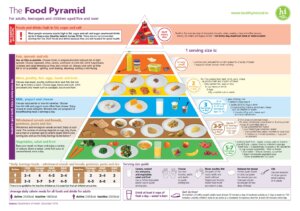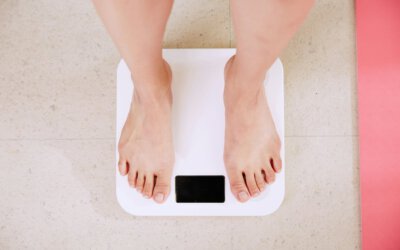High blood pressure, also known as hypertension, occurs when the pressure of blood pushing against your artery walls remains consistently too high. It is measured with two numbers:
120 Systolic: pressure when your heart pumps blood out
80 Diastolic: pressure when your heart rests between beats
Over time, uncontrolled high blood pressure can damage arteries and vital organs, increasing your risk of heart attack, stroke, kidney disease, and other conditions. Often, it presents no symptoms, so regular monitoring is essential
According to the Irish Heart Foundation, nearly two in five Irish adults have high blood pressure — with men (51%) more likely to be affected than women (33%)^[1].
The good news is that small, sustainable changes to your diet and lifestyle can have a major impact.
Eat a Heart-Healthy Diet
Your everyday food choices are one of the most powerful ways to manage blood pressure. A heart-healthy diet in Ireland should follow the HSE Food Pyramid, emphasising:

Eat More Fruit and Vegetables
Aim for five to seven servings per day, with a variety of colours to boost your intake of vitamins, minerals, fibre, and potassium — which helps relax blood vessels and lower blood pressure.Half of your plate should be made up of fruit and/or vegetables at each main meal.
Choose Wholegrains
Include a source of wholegrain at every meal (for example, brown bread, wholegrain pasta, brown rice, oats, or potatoes with skins).One-quarter of your plate should contain wholegrains. These are high in fibre, which supports both blood pressure and cholesterol control.
Include Healthy Proteins
Choose lean meats, poultry, fish, eggs, and plant-based proteins such as lentils and beans. Aim to include oily fish twice per week, such as salmon, mackerel, or sardines.These protein sources should make up the remaining quarter of your plate.
Limit Processed Foods and Salt
Cut back on processed meats like bacon, ham, sausages, and deli slices. Limit salt (sodium) to less than 6g per day — approximately one teaspoon.
Salt is often hidden in foods like soups, sauces, crisps, takeaways, and processed snacks.
Use Healthy Fats in Moderation
Swap saturated fats like butter, cream, and coconut oil for plant-based oils such as olive or rapeseed oil. Use small amounts in cooking or dressings.Too much fat, even the healthy kind, can still affect weight and cardiovascular health.
Consider DASH or Mediterranean Diets
Both the DASH (Dietary Approaches to Stop Hypertension) and Mediterranean diets are backed by research for reducing blood pressure. A dietitian can help you personalise a plan to suit your lifestyle and health goals.
Book a consultation with a Webdoctor dietitian to get started.
Limit Alcohol Intake
Alcohol is directly linked to raised blood pressure. The HSE low-risk guidelines are:
- Women: Maximum of 11 standard drinks per week
- Men: Maximum of 17 standard drinks per week
- At least two alcohol-free days each week
- No more than six standard drinks in one sitting
Many people are unsure what a standard drink means. Use the DrinkAware calculator to check your intake.
Alcohol also slows the fat-burning process, which can hinder weight loss if that is one of your goals.
Get Moving: Physical Activity Matters
A sedentary lifestyle — sitting or lying down for most of the day — can raise your blood pressure over time. Staying active helps maintain a healthy heart, weight, and blood pressure.
Exercise Recommendations
- For general health: 30 minutes of moderate-intensity activity on at least five days per week (150 minutes per week)
- For weight loss: 60 to 75 minutes of moderate activity on at least five days per week
- All adults: Include strength-based exercises twice weekly
If you are currently inactive, start with 10-minute blocks and build up over time. Always speak to your GP before starting a new routine if you have any concerns.
Other Lifestyle Changes to Support Healthy Blood Pressure
To reduce your blood pressure and heart disease risk, you should also:
- Quit smoking (if you need help, check our Stop Smoking service here)
- Manage stress through sleep, mental health support, and relaxation
- Maintain a healthy weight through food and movement
- Stay hydrated and limit excess caffeine
Need Support with High Blood Pressure?
Whether you’ve been diagnosed with high blood pressure or want to prevent it, Webdoctor’s GPs and registered dietitians are available for personalised support.
Book an online consultation for tailored advice and a realistic action plan.




